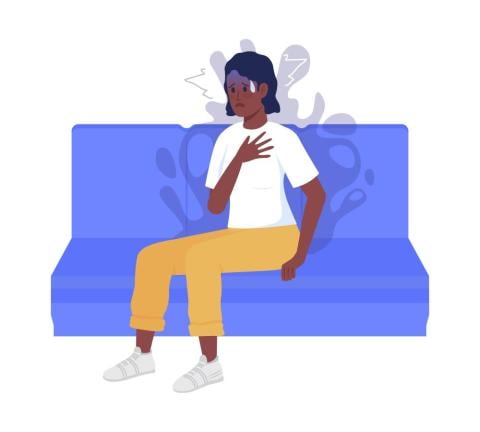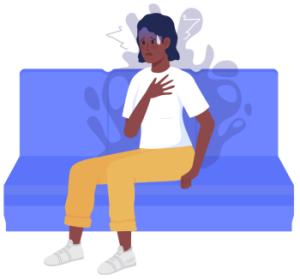Is My Child Depressed?
Is My Child Depressed?

About 3% of US children aged 2-17 are depressed, and 7% have an anxiety disorder. The good news is, there’s a lot that you can do to help your child if they’re depressed. The first step is to know the signs that may mean that your child is unhappy. Keep in mind that most kids will show some of these behaviors at one time or another. If you see several of them or if they are extreme, however, it may mean your child is unhappy.
Age 1.5-4
- Clinging to you
- New difficulties falling or staying asleep
- Changes in appetite (sometimes changes in appetite come before a growth spurt, but if eating habits noticeably change, keep an eye on it)
- Big tantrums that occur multiple times a day, last a long time, or are very physically aggressive
- Crying multiple times a day for a long stretch of time
- Self-harm (hitting their head against the wall, pulling their hair out, scratching themselves)
Age 4-7
- Toileting accidents (many children still cannot sleep the night without peeing, but look out for daytime peeing accidents, pooping accidents, or new nighttime accidents)
- Difficulty separating from you (clinging, crying)
- Tantrums that last a while or occur multiple times a week
- Difficulty falling asleep alone or waking up in the middle of the night
- Change in appetite (sometimes changes in appetite come before a growth spurt, but if eating habits noticeably change, keep an eye on it)
- Crying multiple times a day for a long stretch of time
- Aggression: kids at this age occasionally kick and hit, but if your child is hitting or kicking adults, that’s a red flag. It is more normal to fight with siblings, but biting or serious harm is a red flag.
- Saying they wish they were dead or could just disappear
- Self-harm (hitting their head against the wall, pulling their hair out, scratching themselves)
Ages 8-11
- Frequent worry thoughts
- Difficulty separating from parents (crying, clinging)
- Crying often (more than half the days for at least 2 weeks)
- Difficulty falling or staying asleep
- Changes in appetite
- Physical aggression towards people or property (some aggression towards siblings is still normal)
- Doesn’t have friends or thinks nobody likes them
- New difficulties in school
- Explosive anger and moodiness or tantrums most days
- Weight loss
- Talking negatively about themselves (I’m stupid, I’m ugly, I can’t do anything right)
- Self-harm (hitting or hitting themselves, cutting themselves)
- Saying they wish they were dead or could just disappear
Ages 12+
- Difficulty falling or staying asleep
- Changes in appetite
- Crying often (more than half the days for at least 2 weeks)
- Frequent anger or irritability (more than half the days for at least 2 weeks)
- Lack of interest in things they used to enjoy
- Spending most of their time alone or on their phone
- Drop in grades
- Physical aggression
- Significant weight gain or loss
- Difficulty concentrating
- Worry thoughts and anxiety
- Talking negatively about themselves (I’m stupid, I’m ugly, I can’t do anything right)
- Cutting themselves or other forms of self-harm
- Saying they wish they were dead or talking about death often
What you can do about it
- Schedule a visit with your pediatrician. They can help you figure out if this is developmentally normal or if something is wrong.
- Spend one-on-one time with your child. Even just 5 minutes a day of individual, undivided attention a day makes an enormous difference. Follow your child’s lead, doing what they want to do without worrying about following rules or doing it the “right” way.
- Praise your child often for things they do well and for things you would like them to do more. For example, if your moody teen leaves their room, point out how pleased you are to see them.
- All children, even teenagers, want your attention, so make sure you give more attention to behaviors you want to see more of and less attention to behaviors you’d like your child to do less. This is really hard, but it works amazingly well. Here are behaviors to pay more attention to:
- Following directions
- Using coping skills (deep breaths, walking away rather than making it worse, listening to music to calm down)
- Being social
- Talking about their feelings
- Smiling, being positive
- Being kind and polite
Here are behaviors to pay less attention to (as long as everyone is safe):
- Tantrums
- Crying long after the initial reason they’re upset has been resolved
- Pouting, moping, whining, exaggeratedly sighing
- Acting out, being disruptive, saying rude or inappropriate things
Talk about your own feelings and describe the coping skills you use to stay calm so that you model how to do it for your kids.
Examine your own feelings. Are you moody, anxious, or depressed? Your emotions affect your child, so it may help both of you if you talk to your doctor or visit a mental health specialist.

















